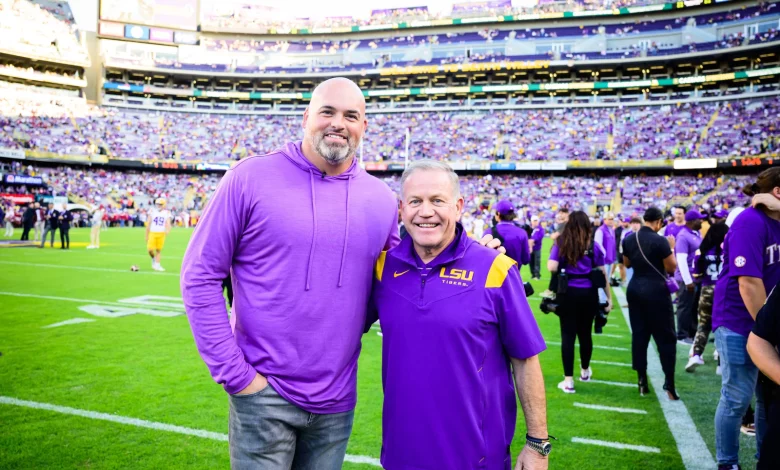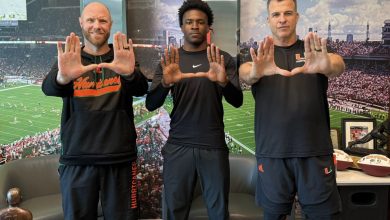Andrew Whitworth, a former LSU football player, was inducted into the Shrine Bowl Hall of Fame.

Andrew Whitworth, a name that resonates deeply in both college and professional football circles, is now part of a distinguished group of athletes who have left an indelible mark on the game. Inducted into the Shrine Bowl Hall of Fame, Whitworth’s journey from a standout at LSU to an NFL legend encapsulates what it means to be not only an exceptional athlete but a true ambassador for the sport.
As one of the most consistent and respected offensive linemen in NFL history, Whitworth’s legacy goes far beyond his on-field achievements. His commitment to excellence, leadership, and his embodiment of the values that make football such a beloved sport in America have all contributed to his storied career. Being inducted into the Shrine Bowl Hall of Fame is a culmination of years of hard work, dedication, and, perhaps most importantly, character that has defined Andrew Whitworth both on and off the field.
Let’s explore the journey that led Andrew Whitworth to this prestigious honor, from his early years at LSU to his unforgettable career in the NFL and his eventual induction into the Shrine Bowl Hall of Fame.
Early Beginnings and LSU Career
Andrew Whitworth’s football story began in the small town of Monroe, Louisiana, where he developed his love for the game at an early age. Standing out for his size, athleticism, and natural talent, Whitworth quickly became a dominant force at Ouachita Parish High School, leading his team to success and catching the attention of college scouts. His skill set, especially his ability to play at a high level in the trenches, made him a highly sought-after prospect, and it didn’t take long for LSU to recognize his potential.
As an offensive lineman for the LSU Tigers, Whitworth’s talents flourished. His first season at LSU was in 2001, where he had the chance to learn under one of the best offensive line coaches in college football at the time, Dale Ogeron. Over the course of his college career, Whitworth’s abilities in both pass protection and run blocking allowed him to excel at a position that often goes unnoticed in the world of college football, but is crucial to a team’s success.
His size—standing 6’7″ and weighing over 300 pounds—was an undeniable asset, but what set him apart was his technique, intelligence, and versatility. He played multiple positions on the offensive line, which showcased his adaptability and willingness to do whatever it took to help his team succeed. By the time Whitworth left LSU, he was regarded as one of the top offensive linemen in the country.
Whitworth’s contributions at LSU were immense, with the team’s offense benefiting significantly from his presence in the trenches. The culmination of his time in Baton Rouge came in 2003, when LSU won the BCS National Championship under coach Nick Saban. While he was not a starting member of the championship team, his contributions were pivotal in building the program’s success during his time there, and his performance at LSU earned him a strong reputation heading into the NFL draft.
The NFL Journey: Drafted by the Cincinnati Bengals
After leaving LSU, Whitworth was selected in the second round of the 2006 NFL Draft by the Cincinnati Bengals. Despite the obvious skill and physicality Whitworth demonstrated at LSU, some teams had questions about his ability to make the transition to the NFL. But the Bengals saw something special in Whitworth, and it didn’t take long for him to prove them right.
Whitworth’s versatility, which allowed him to play at multiple positions on the offensive line during his college career, paid huge dividends in the NFL. He quickly earned a starting role as the Bengals’ left tackle, a position that requires not only physical strength but the ability to protect the quarterback’s blindside. Over the course of his 11 seasons with the Bengals, Whitworth developed into one of the best offensive tackles in the NFL. He earned three Pro Bowl selections and was widely recognized as one of the most dependable and durable players in the league.
His years with the Bengals saw him play in some tough seasons, but his leadership and consistency never wavered. Whitworth’s ability to block against some of the league’s most elite pass-rushers and create lanes for running backs made him a centerpiece of the Bengals’ offense. His commitment to excellence and his ability to stay healthy despite the grueling nature of his position helped cement his legacy in Cincinnati.
A New Chapter with the Los Angeles Rams
After his tenure with the Bengals, Whitworth continued to defy expectations when he signed with the Los Angeles Rams in 2017. At the time of the signing, Whitworth was 35 years old, which is considered an advanced age for an offensive lineman. However, he still had plenty left in the tank, and the Rams took a chance on the veteran to help anchor their offensive line.
That gamble paid off in spades. Whitworth was instrumental in helping the Rams reach the Super Bowl LIII during the 2018 season, where they ultimately fell to the New England Patriots. Still, his leadership and performance that season were crucial to the Rams’ success, and his role as the elder statesman on the offensive line was pivotal. By this point in his career, Whitworth had transitioned into more of a mentor role, helping to guide younger players and instill the importance of discipline, technique, and consistency in their play.
In 2021, Whitworth achieved the ultimate honor when the Rams defeated the Cincinnati Bengals in Super Bowl LVI. It was a fitting conclusion to a remarkable career, and Whitworth’s contributions to the Rams’ Super Bowl victory further solidified his legacy. He was named a team captain, and his leadership was a key factor in the Rams’ success. Whitworth’s final season in the NFL was marked by his ability to maintain a high level of play, even in the later years of his career, which was a testament to his skill and dedication.
The Shrine Bowl Hall of Fame Induction
Whitworth’s journey to the Shrine Bowl Hall of Fame feels like the natural next step in a career filled with excellence, perseverance, and leadership. The Shrine Bowl, which serves as a prestigious all-star game for college seniors, has long been a stage for players to showcase their talents to NFL scouts. Being inducted into the Shrine Bowl Hall of Fame is not just about the recognition of one’s on-field achievements but also a reflection of their character, leadership, and influence on the sport.
Whitworth’s induction is a fitting honor for a player who was a model of consistency and professionalism throughout his career. He was respected not only for his physical prowess but for his ability to lead by example and mentor younger players. Whether it was during his time at LSU, his years with the Bengals, or his time with the Rams, Whitworth has been a steady presence, and that presence has made a lasting impact on everyone who has had the privilege of playing alongside him.
Legacy Beyond Football
Off the field, Andrew Whitworth has continued to be a role model, using his platform to give back to the community. He has been actively involved in charity work, particularly through the Andrew Whitworth Foundation, which aims to support and empower youth through educational opportunities and sports. His work in the community has mirrored his approach to the game itself: with dedication, discipline, and an unrelenting desire to make a positive difference in the world.
Whitworth’s leadership in the community and his role as a mentor to young players both on and off the field further cement his status as one of the most respected individuals in the NFL. His commitment to others, whether through his charitable endeavors or his role as a father and husband, has made him a beloved figure in the world of football.
A Legacy of Excellence
Andrew Whitworth’s journey from a highly-recruited offensive lineman at LSU to an NFL legend is a testament to his hard work, dedication, and love for the game. His induction into the Shrine Bowl Hall of Fame is not only an acknowledgment of his tremendous contributions on the football field but also a celebration of the type of person he is off of it. Whitworth’s impact on the game of football will be felt for years to come, and his legacy as one of the best offensive linemen of his era is secure.
From his days at LSU to his Super Bowl victory with the Los Angeles Rams, Whitworth has proven time and time again that greatness comes not only from physical talent but from an unwavering commitment to excellence. His induction into the Shrine Bowl Hall of Fame is a well-deserved honor and a reminder that success is about much more than just what happens on the field—it’s about the impact one has on their teammates, their community, and the game itself.









